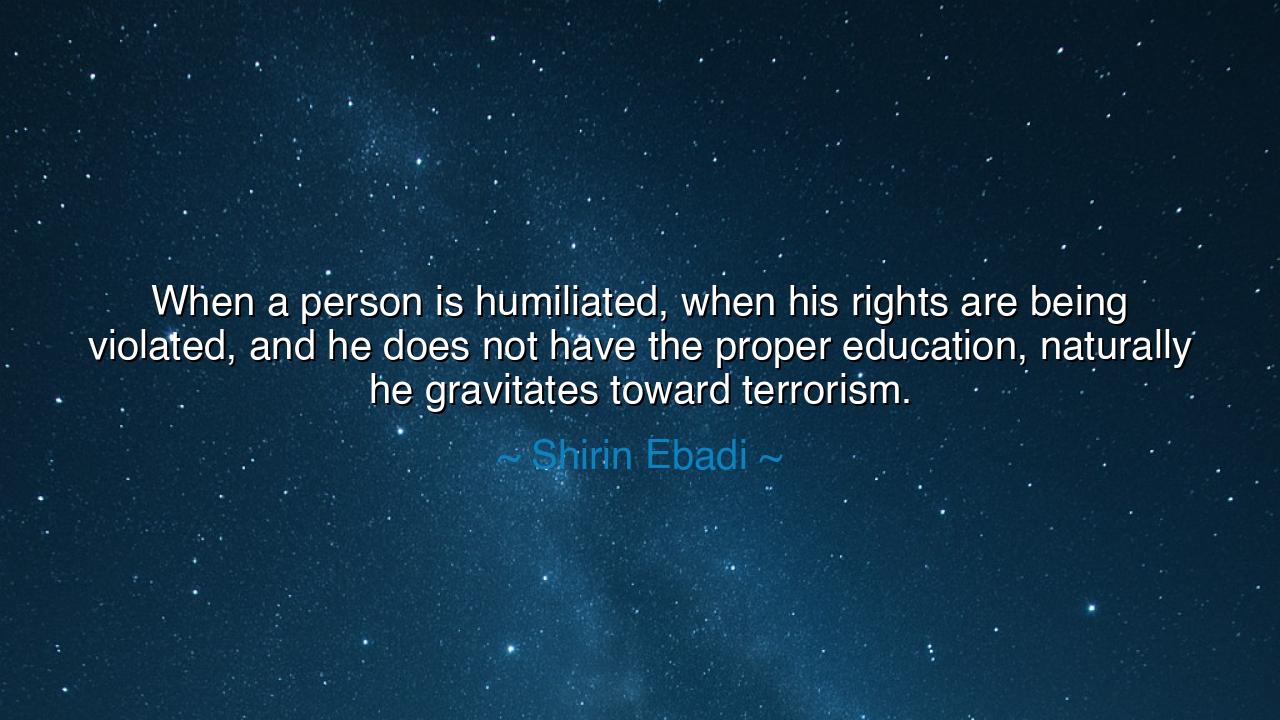
When a person is humiliated, when his rights are being violated
When a person is humiliated, when his rights are being violated, and he does not have the proper education, naturally he gravitates toward terrorism.






The Nobel Peace Prize laureate Shirin Ebadi, a fearless advocate for human rights and justice in Iran, once declared: “When a person is humiliated, when his rights are being violated, and he does not have the proper education, naturally he gravitates toward terrorism.” These words are not spoken in judgment, but in warning — a cry from one who has witnessed the soil from which hatred grows. Ebadi, who dedicated her life to defending the powerless, reveals through this statement that ignorance and humiliation are the twin poisons of the human spirit. They deform what could have been noble, and twist despair into violence.
At its heart, this quote is a profound reflection on the relationship between education and dignity. Education is not merely the learning of facts; it is the cultivation of self-respect, empathy, and critical thought. When education is denied — when the mind is left barren — the person is deprived not only of opportunity, but of the ability to see alternatives to despair. And when that person is also humiliated, stripped of worth, and treated as less than human, rage becomes a seed easily sown. Ebadi warns that terrorism, though evil in its actions, often grows from the soil of systemic oppression and ignorance. To fight it, we must confront the roots — not only the violence itself, but the conditions of injustice that feed it.
The ancient philosophers understood this truth in their own way. Plato, in The Republic, taught that the uneducated man, chained by darkness, mistakes shadows for reality. Without the light of understanding, he becomes vulnerable to manipulation and fear. Similarly, Ebadi teaches that when people are denied education — when they are kept in the shadows — they are easily driven by resentment and extremism. A mind deprived of knowledge becomes a battlefield where pain and propaganda wrestle for control. But a mind that has tasted wisdom cannot be so easily corrupted. Education, therefore, is not only a personal gift — it is a shield for civilization.
History offers painful confirmation of her words. After World War I, when Germany was crushed under humiliation, economic ruin, and despair, it was an uneducated and broken populace that turned toward Hitler’s false promises of renewal. The Nazis offered a perverted sense of purpose to those stripped of dignity — and the world paid the price. The same pattern has echoed across continents and centuries: where humiliation and ignorance prevail, extremism finds its host. Education, by contrast, teaches patience, empathy, and the ability to see others as human. It transforms anger into understanding and vengeance into vision.
But Shirin Ebadi’s quote is not only about nations — it is about individuals. Every human being who is denied respect or opportunity faces a choice: to yield to bitterness or to rise through knowledge. Education teaches the second path. It gives voice to the voiceless and restores a sense of control over one’s destiny. When the oppressed learn to think, to question, to reason, they cease to be victims and become reformers. Ebadi herself is living proof — an Iranian woman who, despite persecution and exile, used her knowledge of law not to destroy, but to defend; not to seek revenge, but to bring justice. Her life shows that education liberates the spirit from the prison of vengeance.
In her words, there is also a plea to leaders and societies. To build peace, one cannot rely on weapons or punishment alone. The true antidote to violence is education — not only in schools, but in homes, in communities, in the values that shape nations. A child taught to think critically will not blindly follow hate. A youth taught compassion will not raise his hand against the innocent. To educate is to arm the soul with light; to deny education is to abandon people to the darkness of rage.
The lesson of Shirin Ebadi’s wisdom is as urgent as it is eternal: if we wish to end violence, we must first end ignorance and humiliation. We must build schools where there are none, speak dignity into those who have been silenced, and replace revenge with reason. For every educated mind is a fortress against extremism, and every act of learning is an act of peace.
So let these words be carried as a torch into the future: education is the truest weapon against hatred. It heals where humiliation wounds, enlightens where oppression blinds, and empowers where despair enslaves. When humanity learns this — when we teach, not merely to inform, but to uplift — then the cycle of violence will begin to break, and the light of understanding will finally pierce the darkness of fear.






AAdministratorAdministrator
Welcome, honored guests. Please leave a comment, we will respond soon